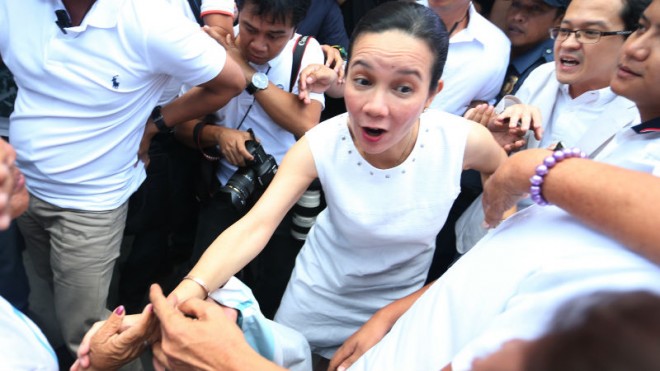Our evidence will stand–Grace Poe
SEN. GRACE Poe on Tuesday attended the hearing for one of the petitions filed against her at the Commission on Elections (Comelec) questioning her qualification to run for President in next year’s polls.
“All the evidence we are presenting are true. We did not invent them. That is why we are confident they will stand,” Poe told reporters in Filipino after the closed-door hearing on the petition for disqualification filed by lawyer Estrella Elamparo.
Poe said she believed the truth would eventually come out since the case was politically motivated.
“What I have been fighting for is the opportunity to serve and help our fellow Filipinos. I believe all this is happening in an attempt to divert my attention from what I can do for our people,” she added, also in Filipino.
Despite being confident she would be able to hurdle the cases questioning her citizenship and residency, Poe admitted she was hurt by Elamparo’s assertion that she should be considered “stateless” and therefore not qualified to run for president.
Article continues after this advertisement“Of all the things she said, perhaps the most hurtful was when she said that I am stateless. It means that I don’t belong to any country. Even refugees have a place they came from,” she said.
Article continues after this advertisementPoe was referring to Elamparo’s statement during the hearing when she was asked by Comelec Commissioner Arthur Lim if she believed that Poe was “stateless.”
“She is at best presumed to be a Filipino but definitely not natural-born,” replied Elamparo. “Legally, yes (she is a stateless person).”
Elamparo said there was no existing or binding law that clearly identified Poe as a natural-born citizen since she was a foundling or a child that had been abandoned and found.

Presidential aspirant Grace Poe is mob by her supporters as she leaves after the hearing for disqualification case filed against her at the COMELEC en banc in Palacio Del Gobernador, Intramuros, Manila.
EDWIN BACASMAS
“There is a legal vacuum in our system that does not seem to address the status of foundlings,” Elamparo said.
Poe’s lawyer, George Garcia, responded by saying that considering a person as stateless was the “height of discrimination.”
He cited provisions in the 1930 Hague Convention on Certain Questions Relating to the Conflict of Nationality Laws and the 1961 Convention on the Reduction of Statelessness as grounds for considering Poe a natural-born Filipino citizen.
Garcia, however, admitted that Poe was a dual citizen from 2006 to 2010.
He said this was “for convenience in overseas travel” when Lim asked him why Poe used her US passport during those years.
“It was allowed, whether that is unfair or not, that is what the law provides. It’s not illegal,” said Garcia.